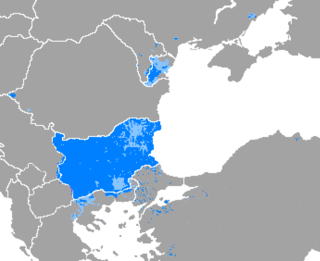Bulgarian language
South Slavic language / From Wikipedia, the free encyclopedia
Dear Wikiwand AI, let's keep it short by simply answering these key questions:
Can you list the top facts and stats about Bulgarian language?
Summarize this article for a 10 years old
Bulgarian (/bʌlˈɡɛəriən/ ⓘ, /bʊlˈ-/ bu(u)l-GAIR-ee-ən; български език, bŭlgarski ezik, pronounced [ˈbɤɫɡɐrski] ⓘ) is an Eastern South Slavic language spoken in Southeast Europe, primarily in Bulgaria. It is the language of the Bulgarians.
| Bulgarian | |
|---|---|
| български език | |
| Pronunciation | bŭlgarski [ˈbɤɫɡɐrski] |
| Native to | |
| Ethnicity | Bulgarians |
| Speakers | L1: 7.6 million in Bulgaria (2011 census)[4] L1 + L2: c. 10 million in all countries (2023)[5] |
Early forms | |
| Dialects | |
| Official status | |
Official language in | |
Recognised minority language in | |
| Regulated by | Institute for Bulgarian Language, Bulgarian Academy of Sciences |
| Language codes | |
| ISO 639-1 | bg |
| ISO 639-2 | bul |
| ISO 639-3 | bul |
| Glottolog | bulg1262 |
| Linguasphere | 53-AAA-hb < 53-AAA-h |
 The Bulgarian-speaking world:[image reference needed] regions where Bulgarian is the language of the majority regions where Bulgarian is the language of a significant minority | |
| This article contains IPA phonetic symbols. Without proper rendering support, you may see question marks, boxes, or other symbols instead of Unicode characters. For an introductory guide on IPA symbols, see Help:IPA. | |
Along with the closely related Macedonian language (collectively forming the East South Slavic languages), it is a member of the Balkan sprachbund and South Slavic dialect continuum of the Indo-European language family. The two languages have several characteristics that set them apart from all other Slavic languages, including the elimination of case declension, the development of a suffixed definite article, and the lack of a verb infinitive. They retain and have further developed the Proto-Slavic verb system (albeit analytically). One such major development is the innovation of evidential verb forms to encode for the source of information: witnessed, inferred, or reported.
It is the official language of Bulgaria, and since 2007 has been among the official languages of the European Union.[9][10] It is also spoken by the Bulgarian historical communities in North Macedonia, Ukraine, Moldova, Serbia, Romania, Hungary, Albania and Greece.